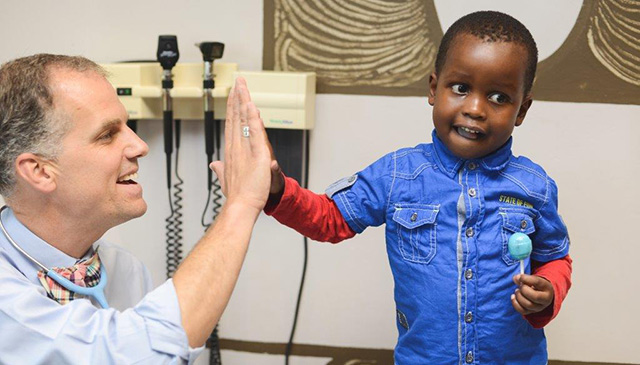 Just 12 short months ago, Texas Children’s Cancer and Hematology Centers, Baylor College of Medicine International Pediatric AIDS Initiative at Texas Children’s Hospital, the Bristol-Myers Squibb Foundation, and leaders in Botswana, Uganda and Malawi, announced a $100 million initiative to create an innovative pediatric hematology-oncology treatment network in sub-Saharan Africa.
Just 12 short months ago, Texas Children’s Cancer and Hematology Centers, Baylor College of Medicine International Pediatric AIDS Initiative at Texas Children’s Hospital, the Bristol-Myers Squibb Foundation, and leaders in Botswana, Uganda and Malawi, announced a $100 million initiative to create an innovative pediatric hematology-oncology treatment network in sub-Saharan Africa.
Called Global HOPE (Hematology-Oncology Pediatric Excellence), the aim of the initiative is to build long-term capacity to treat and dramatically improve the prognosis of children with cancer and blood disorders in sub-Saharan Africa where the overwhelming majority of pediatric cancer and hematology patients do not survive. The mortality rate is estimated to be as high as 90 percent, in large part due to an inadequate health care infrastructure and a significant lack of expert physicians and other health care workers trained to treat children with cancer.
Global HOPE already is making great strides to change these outcomes and the reasons behind them. Since its creation in February 2017, more than 1,000 patients have been treated, 369 health care professionals have been trained, eight physician fellows have enrolled in the first Pediatric Hematology Oncology Fellowship Program in East Africa and seven cancer awareness and survivor events in Botswana, Uganda and Malawi have been organized.
“We’re very excited by the progress in a relatively short amount of time,” said Dr. David Poplack, director of Texas Children’s Cancer and Hematology Centers. “Capacity building takes time. This may mean we exceed our original expectations.”
Initially, Global HOPE leaders envisioned treating 5,000 patients in the first five years, but the expectation assumed the numbers would ramp up as the program did. A similar situation occurred in 2003 after the largest pediatric HIV treatment network in the world was created by the Bristol-Myers Squibb Foundation, Baylor College of Medicine International Pediatric AIDS Initiative and the Governments of Botswana, Uganda and Malawi. The network has leveraged existing experience, infrastructure, and public/private partnerships to train 52,000 health care professionals and provide care for nearly 300,000 children with HIV and their families in sub-Saharan Africa, lowering the mortality rate for these children to 1.2 percent.
“The success we’ve had in radically changing the course of pediatric HIV/AIDS in sub-Saharan Africa is due in large part to the tremendous support provided by the country governments, health care providers on the ground and donors who have made our work possible,” said Dr. Mark W. Kline, president and founder of BIPAI, physician-in-chief of Texas Children’s Hospital and chair of the Department of Pediatrics at Baylor College of Medicine. “We are very pleased by the progress Global HOPE already has made in building a self-sustaining infrastructure that changes the tide of these childhood diseases in sub-Saharan Africa.”
Global HOPE is building on the work Texas Children’s Cancer and Hematology Centers and its partners have been providing children with cancer and blood disorders in Africa for a decade. Through the partnership, Global HOPE is active in three countries and has 51 faculty and staff working in Texas Children’s global sites.
These sites, called Centers of Excellence, are being expanded in Botswana, Malawi and Uganda, and aim to serve as regional hubs for pediatric hematology/oncology programs. Progress also is being made on implementing standard treatment protocols and clinical practice guidelines to ensure quality pediatric hematology/oncology care and services are provided across the cancer care continuum, and positively impact overall pediatric health services.
To develop local leaders in Africa in the pediatric hematology/oncology field, Global HOPE has established the first Hematology/Oncology Fellowship in East Africa in Uganda. This two-year fellowship is accredited by the Uganda Medical and Dental Practitioners Council and incorporates online training, live lectures, rotations from sub-specialists to provide training on-site, and professional development opportunities, including attending scientific conferences and participating in leadership seminars.
“This fellowship is one of the most important things we are doing in Africa,” Poplack said. “It is the formal educational program that enables us to build medical capacity to diagnose and treat pediatric blood disorders and cancer.”
The Bristol-Myers Squibb Foundation is committing $50 million over five years to fund the training of health care providers as well as clinical infrastructure and operations. Global HOPE will raise an additional $50 million for the initiative.
Read these blogs to learn more about Global HOPE:
Global HOPE supports parent-led advocacy group in Uganda
How a blueprint for treating HIV/AIDS is helping address childhood cancer in Africa

